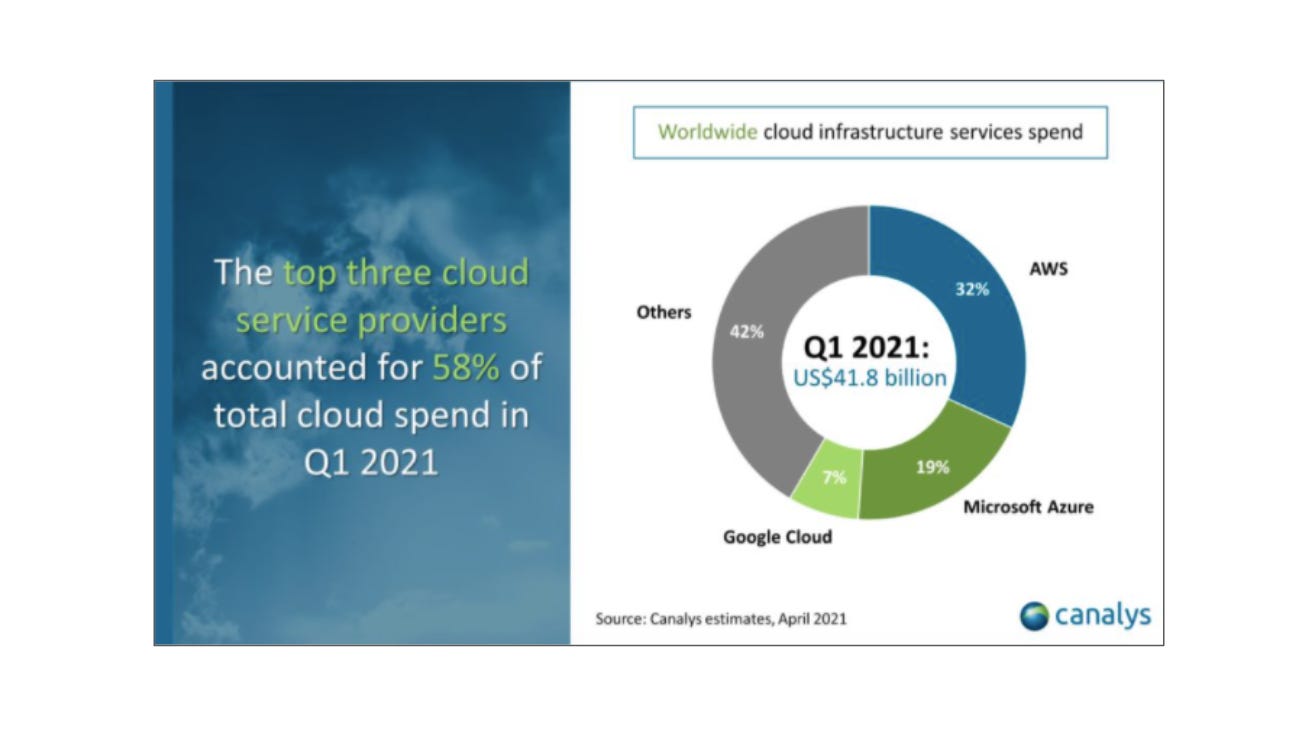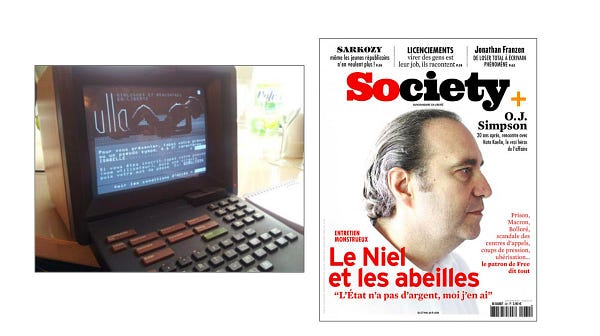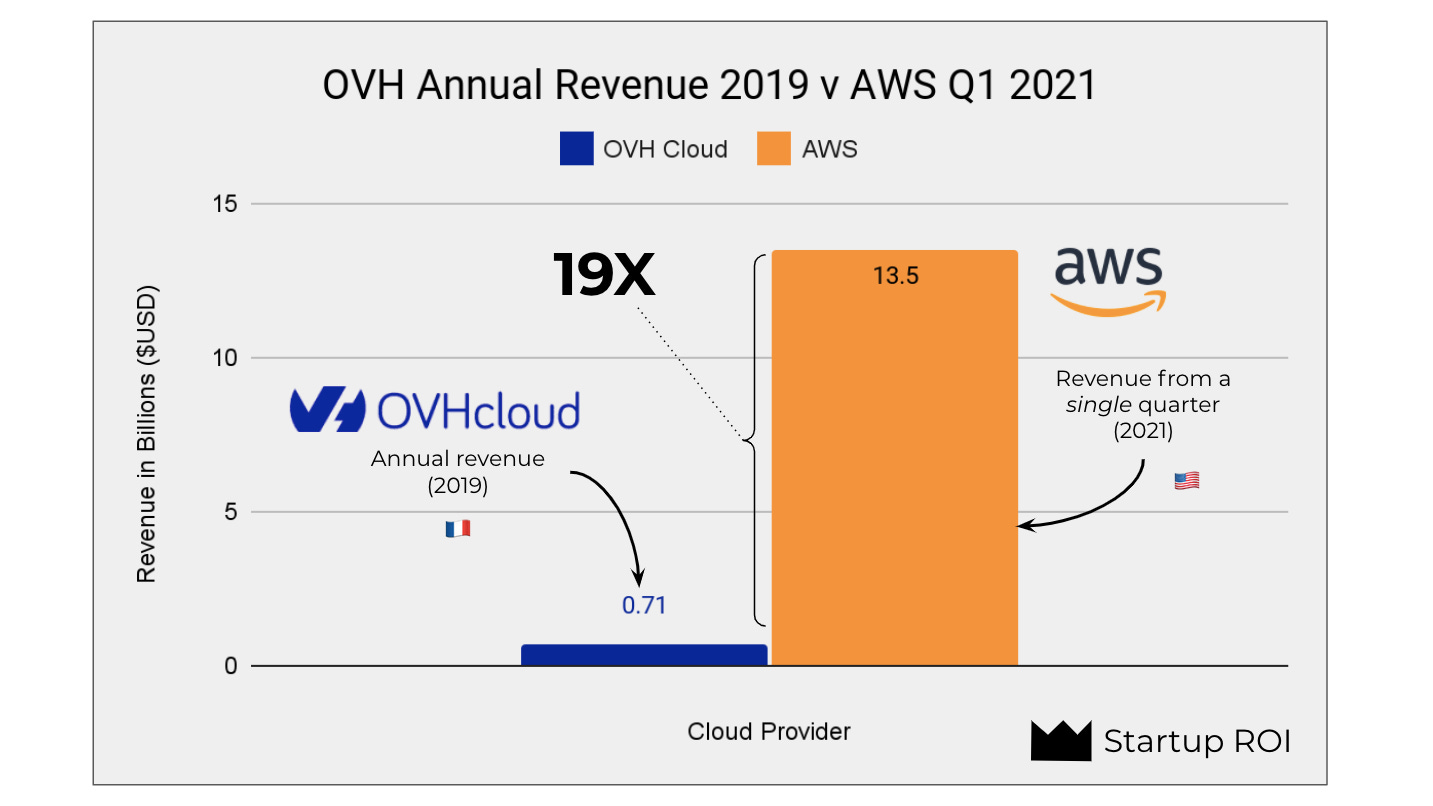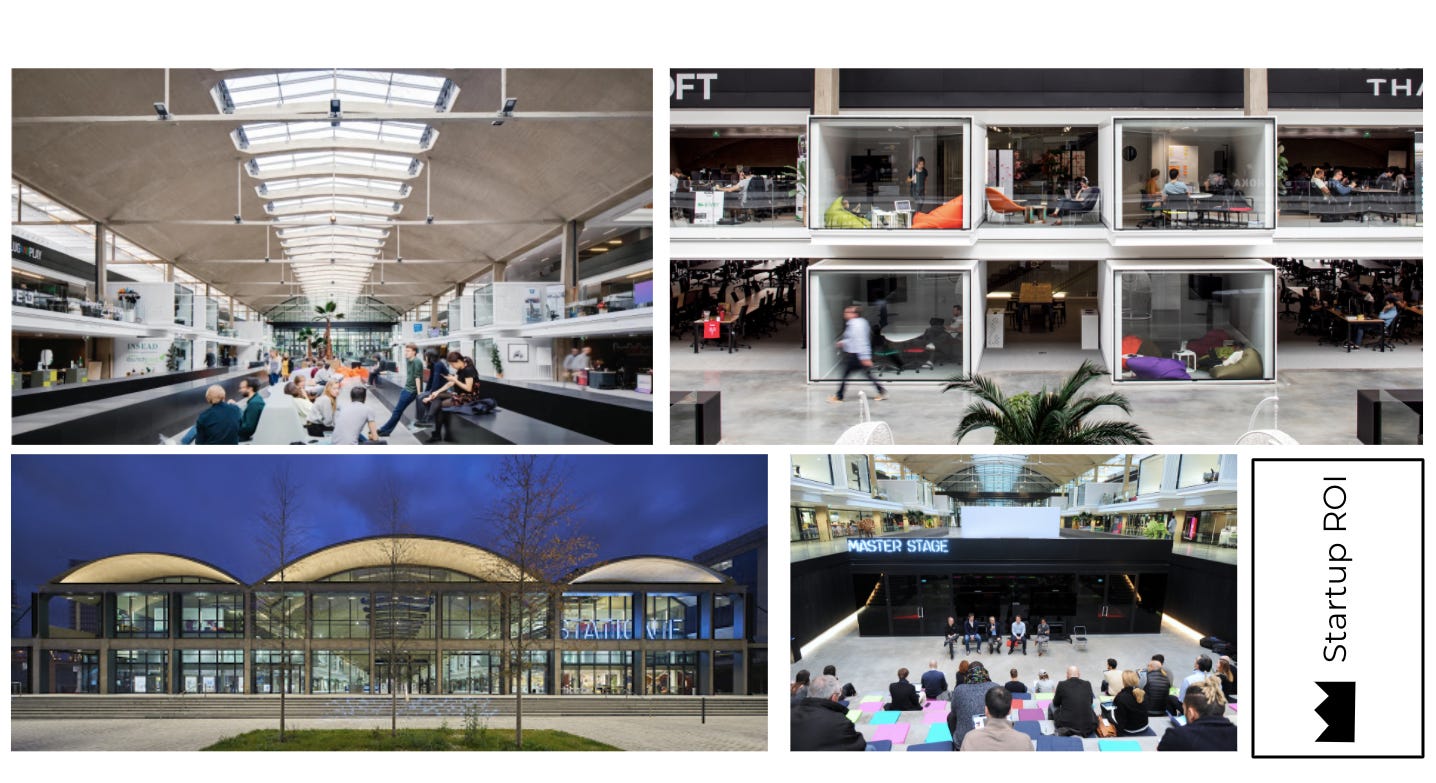🇫🇷 The Next French Revolution
Digital Sovereignty & Macron's Ambition to put La French Tech on the Map
Preamble
Tomorrow is le quatorze juillet, better known among anglophones as Bastille Day (French Independence Day). As a fourth of July baby myself, I like to pretend that the celebratory fireworks over the Champs-Elysees are coincidentally ten days late — but, of course, everything is not about me! In light of this national holiday, I thought what better way to honor La France than to peer into its history, evaluate its present, and look towards its future — with regard to "tech" that is…
France is a country quite literally known for revolution. Many readers may not know Victor Hugo, but you better believe they remember the name of Anne Hathaway's character in Les Misérables (Fantine). And if we learned anything from that story, it's that revolutions tend to be uphill battles that require the perfect mixture of leadership, motivation and timing to succeed. So perhaps it's not hyperbolic when white papers covering the tech scene here are titled: "The French Tech Revolution."

France is undergoing a total "rebrand" from land of the 35hr work week to Europe's innovation hub but the process is a long one. Some days it feels like we are close to a tipping point (you could argue this newsletter is proof!) with each new fundraising announcement breaking records set by the previous one. Behind the scenes, however, there are strategic forces that have set in motion the machine de guerre we see today.
In this piece, we'll explore these key players, unpack the term digital sovereignty, and highlight the companies vying for the top spot to ensure liberté, egalité, & fraternité in this former empire. Speaking of emperors, let's start off with a fitting (apropos) quote from Napoleon Bonaparte:
Ability is nothing without opportunity.
Inspiring! Although he also said Religion is what keeps the poor from murdering the rich so take it with a grain of salt.
The Cloud Wars
The Quest for Digital Sovereignty
Xavier Niel (Minitel Porn to Telecom Mogul)
Birth of "La French Tech"
On the Move! (En Marche!)
The Cloud Wars
I'm going to start off by introducing one of the least sexy phrases in tech: infrastructure as a service (IaaS). You've probably heard of Software as a Service (SaaS) but if you peel back one more layer you get to the hardware that essentially powers the entire internet. Though you might not be actively aware of it, each action you take (digitally speaking) initiates a ripple effect from your device, through the software and all the way down the hardware layer of the stack of technologies underpinning the magical place we call the internet. Let me elaborate:
The Internet Age ushered in an era of abstraction. Graphical user interfaces (GUIs) abstracted away the complexity of data tables, mobile applications abstracted away processes powering payments and online interactions, and in many ways, "the cloud" has abstracted away the need for physical hard drives and data storage. As our phones get smaller and more powerful, we generate data at a mind-boggling rate, but most of it isn't stored locally, rather it's in the cloud. But just because we can't see the cloud, doesn't mean it doesn't exist.
Cloud computing is a scale business, meaning you reap the benefits from the upfront costs (setting up infrastructure) once you've reached a certain size. It's also a complicated (technically speaking) and very sensitive business (data breaches, disaster prevention, data loss etc.). Needless to say, the stakes are high. For the most part, "Big Tech" sort of stumbled into this area because they were either already doing it internally and figured they could monetize it elsewhere or because they had the technical minds and firepower (read: moolah) to take their shot. The cloud computing industry is massive. In 2020 it was valued at around $371B but is expected to hit $832B by 2025. With those figures, you would think it's a highly competitive market; yet the reality is there are only a few major stakeholders (namely in the US and China) that dominate on a global level. According to Canalys, three players in the US garnered a 58% market share in the first three months of 2021!

When you look at the chart above, however, you should be thinking to yourself: who makes up the other 42%? It's a good question. If you work in the technology space and are reasonably familiar with your product team, you've probably overheard developer operations (dev ops) folks talk about implementing Kubernetes (Google Cloud offering) or theorizing on the newest continuous integration strategy for their AWS environments. But unless you are a subject matter expert (or, in this case, familiar with the regional markets), you probably haven't heard of them.
In France, there are three cloud providers of note: OVH Cloud, Scaleway, and 3DS Outscale. Together, they provide enough cloud infrastructure to support the entire French tech ecosystem (an important detail for the next chapter) and independently they are highly profitable enterprise companies. But tête à tête with the big guys, they pale in comparison.
The graphic above illustrates this point quite nicely. The key piece of information here is that those earnings are reported over different time periods. This means that in a single quarter (3 months), Amazon Web Services (AWS) makes 19x more revenue than OVHcloud does in a whole year! We're talking orders of magnitude here.
But the French tech ecosystem is younger and less mature than that of the US! you quip to yourself quietly. This is true. But as we look to the future, these companies will play a major role not only in the tech community but in government and national identity. As a result, the conversation is shifting from data privacy to the notion of digital sovereignty. Nowhere in Europe is this more topical than in France.
The Quest for Digital Sovereignty
Digital sovereignty refers to the ability to have control over your own digital destiny: the data, hardware and software that you rely on and create.
— World Economic Forum
In a recent interview, my good friend President Macron outlines the state of affairs with 3 acronyms:
the US has GAFA
the Chinese have BATX
and the French, we have RGPD
If you're familiar with these terms, you have to give it to him. In a single self-effacing sentence, he manages to challenge the status quo at home, maintain support for popular (yet at times questionable) legislation, and take his hat off to worldwide leaders in tech. Quite the feat!

Let's break it down:
GAFA = Google, Amazon, Facebook & Apple
BATX = Baidu, Alibaba, Tencent, Xiaomi
RGPD = Réglementation Générale sur la protection de données aka GDPR in English (basically all those popups you see when you land on a site in Europe that asks if you want to allow cookies)
Macron's pithy, political tagline plainly stated is that America and China have the most valuable tech companies in the world and all we got was this lousy data regulation policy. To be fair, he follows up by saying that GDPR regulation has become a worldwide reference point for the future of data protection; but he insists that it's important to strike a balance between safety, privacy and innovation. It's as if one day, he woke up, looked left and then right and came to the realization that every business, app and technology was either created by or hosted on American or Chinese companies and servers. If the next frontier of business, innovation, statehood and sovereignty rests upon ownership and control of the flow of data, France is falling behind.
We don't think about this too often in the US for exactly the reasons outlined earlier (i.e. we own a majority stake in the internet). We take this for granted. And with access, ownership and innovation comes power. More and more, the internet and data have become the commodity of the 21st century, much like electricity and oil were foundational for the transformation of energy and therefore business in the 20th century. All I'm saying is that we've started wars for less. So if the idea of data and big tech as a national security issue sounds extreme to you, I would respectfully disagree.
It's hard to imagine the scope of data we will produce as a civilization moving forward. We've only just scratched the surface. Broadly speaking, this is a really good thing economically. It's estimated that the industrial Internet of Things (IoT) alone can add $14 trillion of economic value to the global economy by 2030. Mobile phones are no longer the only connected devices, but cars, trucks, refrigerators, even packages! As we accelerate into this hyper-growth (and hyper-connected) phase, it's probably worthwhile to reflect on the potential consequences and how to approach the structural changes instead of just breaking barriers and cleaning up the mess down the line.
The good news is that there are already many organizations problem-solving in advance through research and policy-making channels. Gaia-X, for example, aims to be a "federated data infrastructure for Europe" and the Institut de la Souveraineté Numérique is a non-profit exploring the potential impact of these changes on society in France and communicating with the public and those in public office to raise awareness. For France (and virtually any country that isn't the US or China), tackling these problems head-on, evaluating national security implications and most importantly fostering innovation & attracting talent will be critical for success and stability in the near future. Macron's vision, it seems, is to find a balance between reckless, unregulated technological innovation and repressive data privacy rules. If he can find that sweet spot, pass thoughtful legislation and turn France into a destination for innovation, he might just be able to construct a powder keg ready to ignite the next French Revolution.
Macron serves as the figurehead for this movement. But to fully contextualize the significance of France's recent changes, we have to pay homage to the godfather of French Tech and one of today's power brokers behind the scenes.
Xavier Niel
It's tough to summarize Xavier Niel. You could commission a wall-sized renaissance painting to try and depict his accomplishments, business network and personal life and still not capture it all. Since I'm not much of a painter, I used a modern day paintbrush (Twitter) to outline his improbable beginnings and subsequent rise to telecommunications mogul.


It's hard to be more concise than a well-worded Twitter thread, but I'll try (or just go read the damn thread!). Xavier Niel did the following:
Built the equivalent of a "porn hotline" on the Minitel (a precursor to the internet); dropped out out of school, made his first million by age 24
Legitimized operations by purchasing a media license (could create services on top of the Minitel console/network); bought out his co-founder, re-branded his media group "Iliad"
Moved into telecommunications via early internet investments and the founding of two companies that are still household names today: Free Mobile (wireless co. / T-Mobile of France) & Scaleway (cloud infrastructure — 1/3 majors in France today)
Angel investor in some of "big tech's" early winners (Uber, Airbnb etc.)
Created Kima Ventures to fund promising entrepreneurs worldwide and co-sponsored Station F (investing $250M of his own money) to construct the biggest startup campus in the world
Long story short: he's a bit of a legend as far as startup lore goes. Currently worth over €8B, his fortune is dwarfed by his father in law, Bernard Arnaud, CEO of LVMH and the 3rd richest man in the world. Sometimes it's difficult to put things in perspective, especially when you don't have personal experience with the products, person or impact they've made. So for that reason, I've created the BBB Index to place Niel within a relatable framework. I'm not talking the Better Business Bureau here; this is what I call the Bezos-Benioff-Branson index and should tell you everything you need to know to understand the French billionaire at hand.

All jokes aside, Xavier Niel is a hugely important figure in the French Tech scene. Many of the organizations listed above have had a lasting impact. In fact, if you were to draw out an org chart of the French Tech ecosystem, you'd find Niel's fingerprints all over it. Xavier Niel was "French Tech" before the term "La French Tech" was coined. But in the past several years, that very organization has been instrumental in maintaining the drum beat toward digital sovereignty.
Birth of "La French Tech"
I've been reading "Revolution Française: Emmanuel Macron and the quest to reinvent a nation" by Sophie Pedder. I couldn't help but recognize some childhood similarities between young Macron and Napoleon: precocious, literary teens (both wrote unpublished books!) with a tendency to be "outsiders" in their community (Macron by choice, Napoleon perhaps less so). Napoleon, known for his leadership during the French Revolution, subsequently took on the role of First Consul of France in 1799. Historically speaking, his legacy is the Napoleonic Code, an influential set of ideas that have been cited as "the greatest codification of laws since the fall of the Roman Empire" by historian Andrew Roberts. Although Napoleon consolidated power quite deftly, he organized around him several governing bodies that enabled him to run the empire efficiently and "quasi-democratically" : a senate, a tribune, a legislative body, 2nd & 3rd consuls, as well as local governments that rolled up into the higher organization.
Lucky for you, I'm not here to dissect Napoleonic Code nor pontificate on his accomplishments (or problematic nature). But to stretch this analogy to its fullest, I would like to attempt a breakdown of the French Tech ecosystem and the bodies (government and otherwise) that have cropped up in service of Macron's broader vision for digital sovereignty.
If countries of the future are to be run like tech startups, then here is France's organizational chart. I've broken the departments down into three primary categories: Finance, Strategy, and Sales & Marketing. Though nascent, the ecosystem in France has already developed some complexity. What's most striking is the delicate dance between public and private branches to enable growth across the board.
Finance
The "Finance Department" for example, is composed of two key teams. BPI France is a public investment bank that injects around €5B in capital each year into domestic startups (the decision-makers internally, however are experienced investors not public servants). Private venture capital, which was formerly sparse, is now booming with savvy investors and partners ranging from angel to late stage funding rounds.
Strategy
Moving on to "Strategy," we also see a bifurcation between public and private contributors. In this case, various government ministers responsible for initiatives ranging from the digital economy to foreign trade and citizenship; paired with some of the aforementioned policy organizations (domestic and pan-European) you've got a flywheel of ideas into action to bolster initiatives like recruiting talent, easing bureaucracy or promoting the value of these companies in terms the general public can understand (jobs, growth, public welfare).
Sales & Marketing
Lastly, we've got "Sales & Marketing," always the center of attention! La French Tech is essentially the ecosystem "hype man" — this is the utmost compliment, by the way. Under the stewardship of Kat Borlongan, former Director of the organization, they have helped the ecosystem grow from 3 to 16 unicorns, expanded to 121 hubs around the world (up from 36) and rolled out amazing programs to attract foreign talent (French Tech Visa) and support immigration & diversity (French Tech Tremplin). If La French Tech is the hype man, then Station F is their stage. The renovated cargo depot in the 13th arrondissement of Paris is now the largest startup hub on the planet. Think of it like the Y-combinator of France: startup accelerator programs, sponsored incubators by industry vertical, events & networking opportunities all wrapped into one. The campus is impressive and certainly worth a trip if you have a chance to visit.
Combining these has been a potent strategy thus far. Even the old guard enterprise companies of France are getting involved to groom these new innovators. Though digital sovereignty may still be on the horizon, it's clear the battle strategy is working.
On the Move! (En Marche!)
From my vantage point, France seems to have lost the battle but is certainly a contender for winning the war. Digital sovereignty is in line of sight and it's a matter of keeping up momentum and building on top of the foundation put in place over the past several years. Naturally, I'm bullish on this ecosystem, after all, I'm dependent on it to keep writing this newsletter. But objectively, there is an energy that feels fresh, optimistic and exciting. With that in mind, there is also uncertainty lurking on the horizon. Namely, a presidential election in 2022 (En Marche! is Macron's centrist party's name). In the wake of some big changes (and radical societal transformations) it will be interesting to see if far-right, nationalist challengers can put up a fight. Personally, I would much prefer another 5 years of technological progress and leadership promoting digital sovereignty for an increasingly digital and global economy.
Sometimes, being an outsider gives you a unique perspective, one that brings insight that's impossible to come across from within. Napoleon, a lifelong outsider, rose to power and transformed post-revolution France; Macron, a self-proclaimed outsider and consummate networker appears to be doing the same for his country in the digital era. I'll end with a quote from the godfather of French Tech and centerpiece of today's article, Xavier Niel:
I like being an outsider. It is better in France on the outside.
To that, I respond: same!
I hope you're enjoying this as much as I am — please share with other smart/interesting/wildly successful people such as yourself! 😉
The “one-stop-shop” ➡️ Click Here
🐦 Twitter: @StartupROI & @RoiStartup 🧐 choose wisely
👔 LinkedIn: Startup ROI
📸 Instagram: @startuproi
🎁 Feedback is a gift — 📩 bonjour@startup-roi.com











